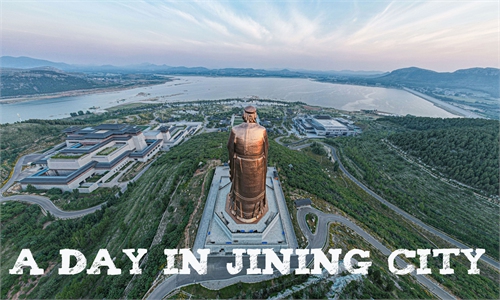ARTS / CULTURE & LEISURE
Intangible cultural heritage related to Confucianism treasured and carefully preserved
People in Jining, East China's Shandong Province believe their intangible cultural heritage is their genetic code.
The city in southwestern Shandong is rich in historic and cultural heritage - it is the hometown of Confucius, Mencius and other great ancient philosophers; it is also a major city by the Beijing-Hangzhou Grand Canal; in every dynasty, Jining has been mentioned in writing in various works of literature.
Nowadays, the city is left with the tangible remains of its long history, such as the buildings that mark the glory of Confucius' families and museums about the Grand Canal among other heritage sites.
Meanwhile, the intangible cultural heritage of Jining continues to be treasured and carefully preserved.
Intangible cultural heritage is an indispensable part of people's lives. Its protection and transmission to future generations play an important role in the development of culture and society.
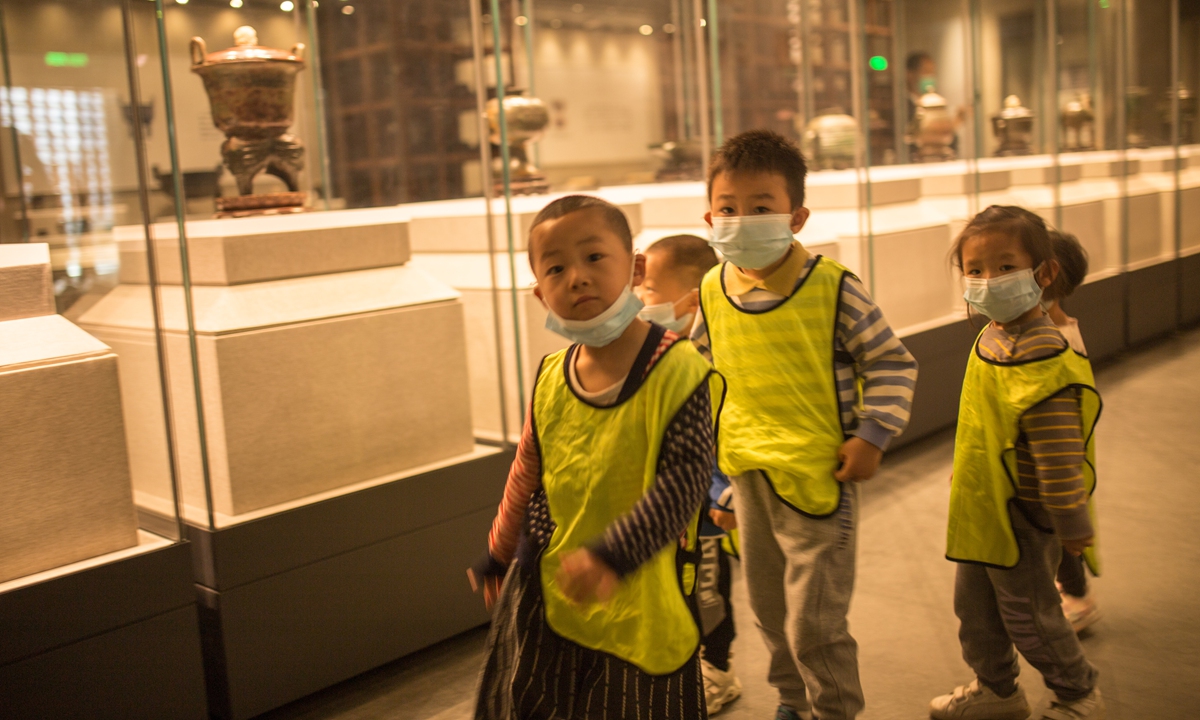
At present, there are at least 17 national-level intangible cultural heritage representatives, 61 provincial-level, 210 municipal-level, and more than 600 county-level projects, which basically cover all categories of the intangible cultural heritage at all levels. The number ranks among the top in the province.
In terms of representative inheritors, Jining has 11 national-level, 36 provincial-level and 165 municipal-level inheritors, forming a complete four-level, intangible heritage list system.
All counties and cities in the city have established a comprehensive project database, archived and preserved intangible cultural heritage projects through videos, pictures, texts and other media. The city has established a regular tournament system with related inheritors showing and passing on their inheritances.
Intangible cultural heritage is the cultural epitome of a place and represents its cultural soft power. It is of great significance to protect and transmit this heritage.
People in Jining believe that only by digging deeper and making good use of their intangible heritage might the cultural treasures left by their ancestors be remembered in the swift tide of the modern age, and allow the local culture to be more vibrant.
Confucius and foodie
In 2016, a TV documentary, Confucius Was a Foodie, was broadcast in North America, with star chef Christine Cushing exploring the essence of traditional Chinese cuisines guided by Confucius' philosophy on food.
Confucius once said, "With coarse rice to eat, with water to drink, and my bent arm for a pillow; I have still joy in the midst of these things." But cherishing simple and ordinary does not mean he was not picky about food - The Analects of Confucius showed that the famous ancient philosopher cared for sanitary and healthy food; he also paid attention to the art of food, saying that food should be delicate and nicely prepared; moreover, he believed in dining there should be etiquette.
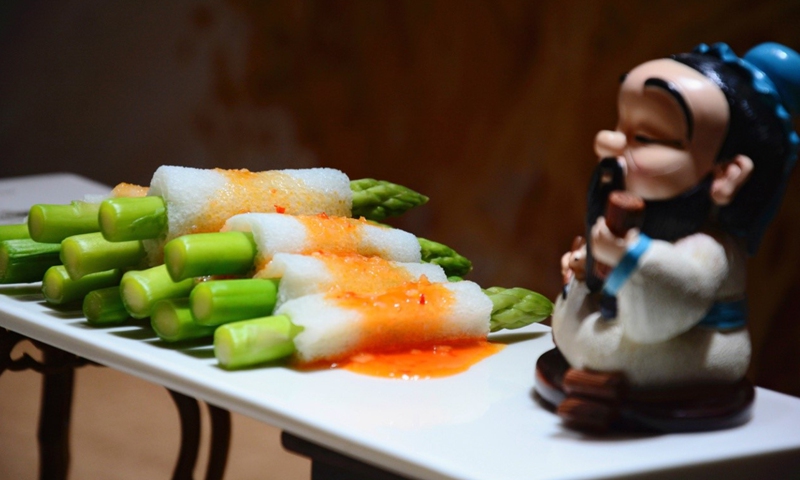
Confucius Cuisine
"He did not dislike to have his rice finely cleaned, nor to have his minced meat cut quite small," Confucius said.
Confucius' philosophy on food was inherited by his descendants. In history, when receiving emperors, senior officials and other noble guests, or hosting family feasts, the Duke of Yansheng, a marquis title given to the direct descendant of Confucius, would prepare exquisite and tasty food.
The food gradually formed the unique Confucius Cuisine with deep cultural essence therein. In 2011, the skill to cook Confucius Cuisine was included in the list of China's national-level intangible cultural heritages.
The history of Confucius Cuisine could be dated to 272 BC and was inherited with innovations.
It has several features, covering its ingredients, skills, outlooks, names, and even the containers, Kong Fanyin, an inheritor of the Confucius Cuisine, told the Global Times. Kong has been cooking the cuisine for 34 years in a local restaurant in Qufu.
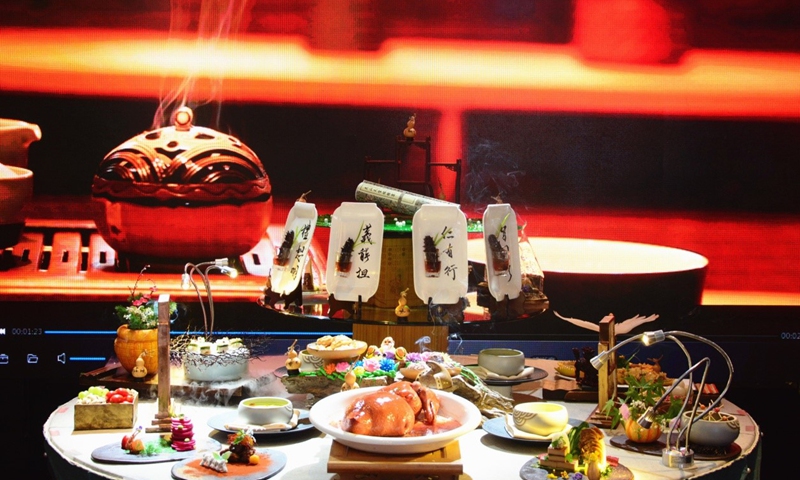
Confucius Cuisine
Firstly, Confucius Cuisine picks ingredients from a very broad range of sources - no matter whether it is from the mountain or the sea, grains or vegetables, fungi or fruits, all could be used in Confucius Cuisine dishes. Chefs of Confucius Cuisine would pick the best ingredients available, and use them in different ways.
Skills associated with the cooking of Confucius Cuisine are complex and comprehensive. To make a full diner, it would take up to three days and seven or eight people to complete preparations.
Another characteristic is that Confucius Cuisine is good at seasoning the food with special soups, which are made by using three fat ducks, three fat hens, three pigs and some chicken feet, pig ribs and several other bits of seasoning.
The containers of Confucius Cuisine show its luxury. In the Confucius Museum in Qufu, a full set of Confucius Cuisine containers fill a huge exhibition room. The bowls, dishes and wares were made into different shapes, illustrating what's inside, such as duck and carp.
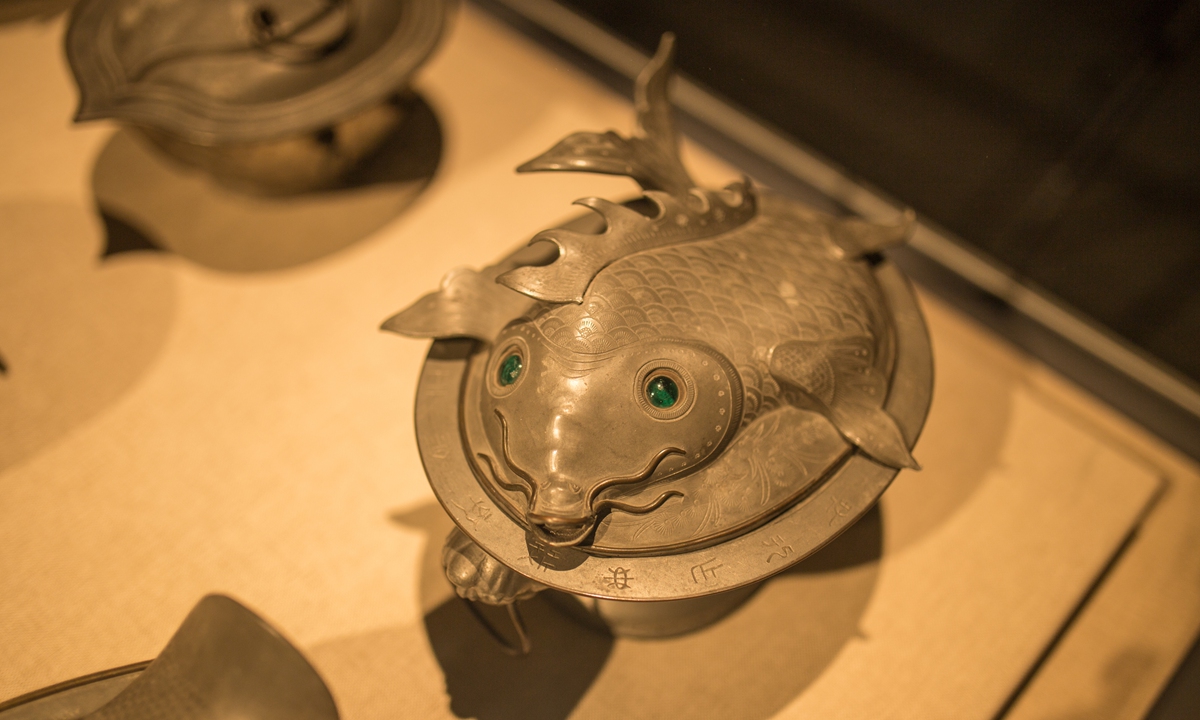
The highest level of Confucius Cuisine has 196 dishes, which were used to host emperors.
Nowadays, ordinary people in Qufu could also have the opportunity to experience a bit of it. Dishes such as smoked Tofu have become a daily staple for local residents to enjoy.
Confucian Cuisine is a unique cuisine formed by the descendants of Confucius in their long-term life practices. It embodies the distinctiveness and heritage of Confucian culture. Among all the Chinese cuisines, Confucius Cuisine has the most cultural connotation and artistic characteristics.
The art of fire and clay
In the ZooParc de Beauval of central France, giant pandas, Huan Huan and Yuan Zai are unsurprisingly the most popular stars. As visitors continue to enjoy the undeniable cuteness of the pair, they might also be blown away by the elegant Chinese-style building at the panda house, especially its shiny glazed tiles.
The colorful glazed tiles are produced by Qufu Glazed Tile Factory Co in Jining. For centuries, the factory has made tiles for the Temple of Confucius, the Mansion of the Kong family and the Forest of the Kong family.
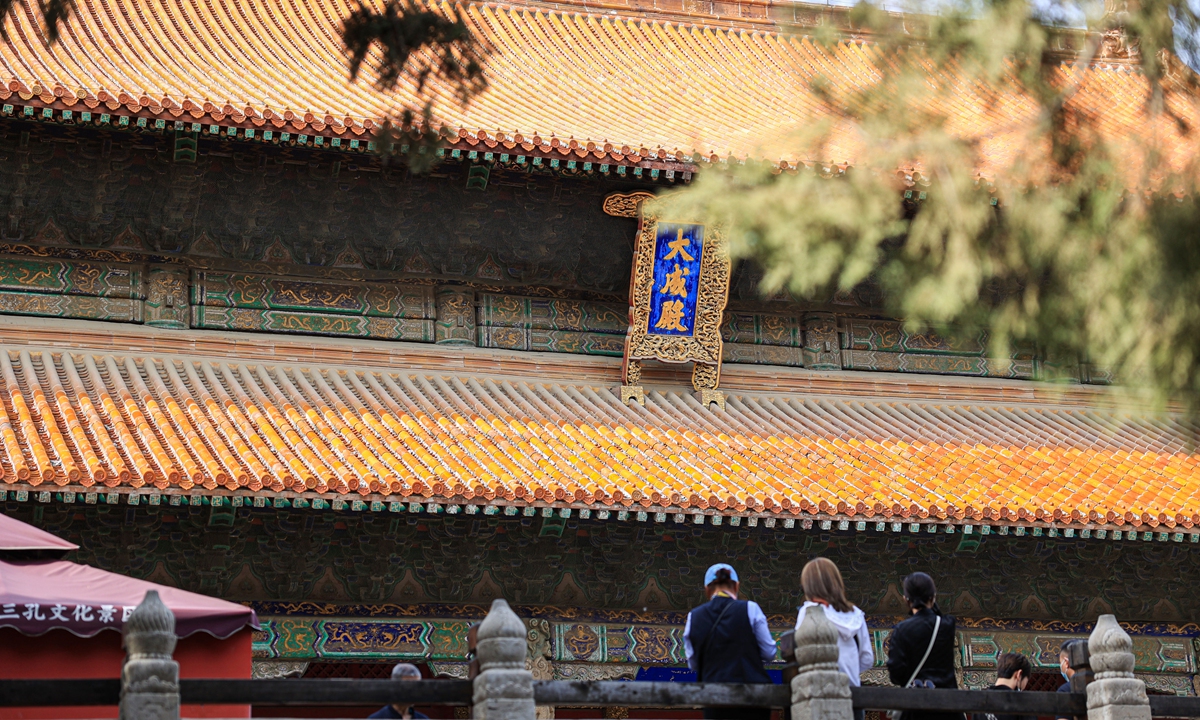
The Confucius Temple Photo: Yang Ruoyu/GT
The earliest history could be traced back to the year of 1008 when the Zhenzong Emperor of the Song Dynasty decided to enlarge the Confucius Temple and ordered the Zhu family in North China's Shanxi Province to move to Qufu for making glazed tiles.
Nowadays, the factory continues to make glazed tiles for the renovation of the three most significant buildings related to Confucius. Moreover, inheritors of the techniques of making glazed tiles have promoted this intangible cultural heritage and sold their tiles to the whole of China and international markets.
In 2014, the technique of Qufu's glazed tile making was included in China's representative List of the Intangible Cultural Heritage.
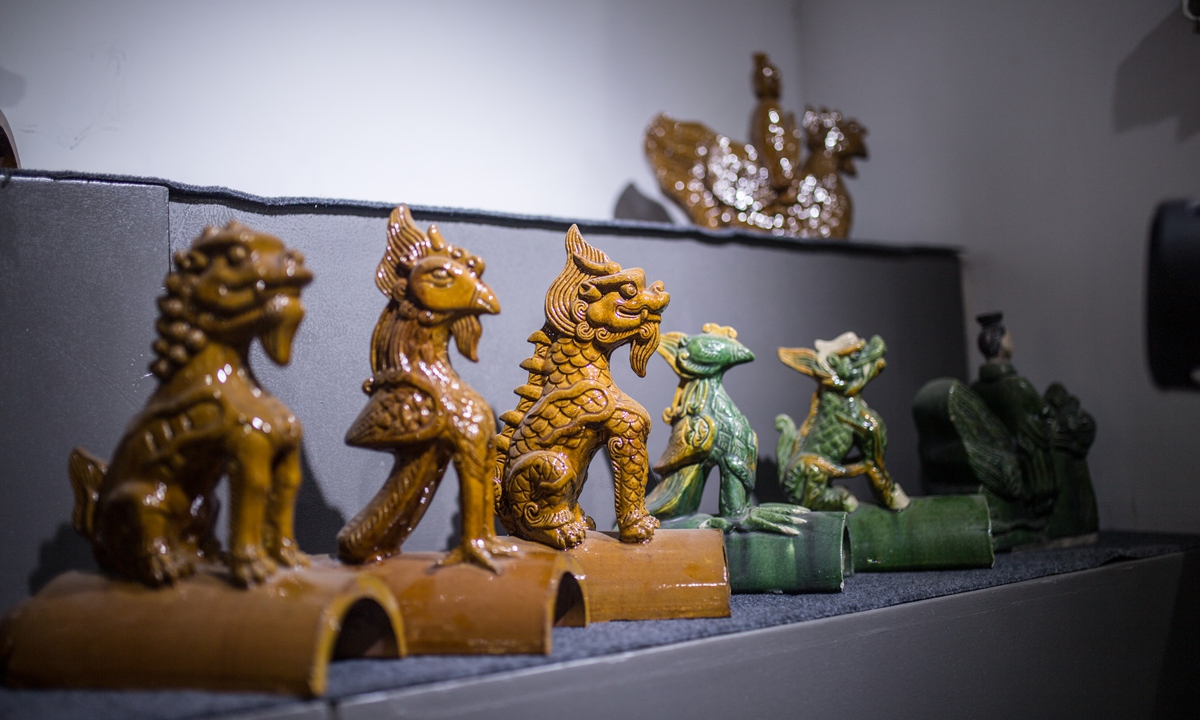
Wang Shubao, 58, chairman of the company, is the national-level inheritor of the skill. He has been working in the industry for 40 years.
In China, glazed tiles are the representatives of beauty. They are solid, colorful and bright. They are cherished in the building of ancient China, Wang introduced.
Wang posited that glazed tiles made by the Qufu glazed tile factory are different from many others. "Ours are more polished and refined."
For example, the lion statues on the roofs of the Confucius Temple and the Confucius Mansion look less fierce than others but are more gentle, which reflects a temperament influenced by Confucian culture.
To cater to the needs of modern times, the glazed tile factory has been making innovations. For instance, Wang led the factory to build a natural gas kiln using to replace the original one, in order to reduce polluting emissions while burning the tiles.
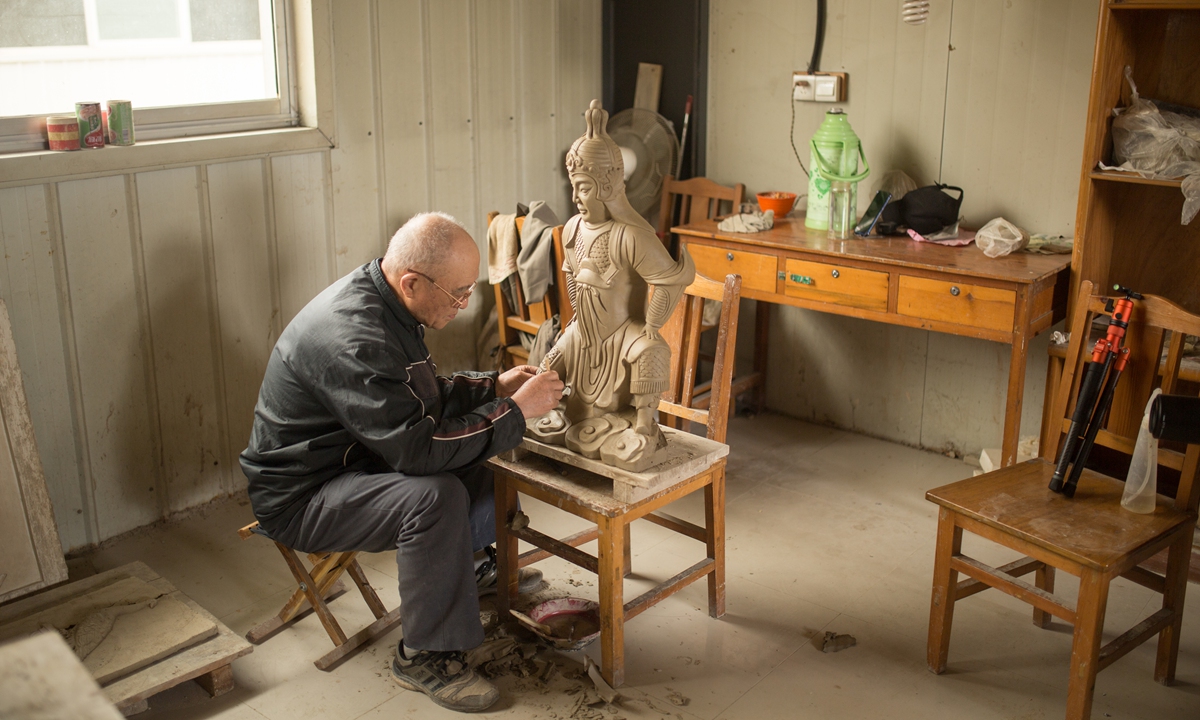
The glazed tiles produced in Qufu are welcomed by customers in many regions such as the South West China's Tibet Autonomous Region. Tiles are also exported to countries including the US, Israel, Ukraine, Germany, Australia, Japan and Russia.
Wang hopes that more young people can join the team to inherit and promote the technique of making colorful glazed tiles. To fulfill this wish, he plans to build a museum for the tiles and invite more students learning art to experience the ancient technique at the factory.
Sound of life
For people in northern China, the sound of suona surrounds every aspect of their lives - the suona band is indispensable, no matter the occasion, whether wedding or funeral. Suona is a typical Chinese wind instrument.
The suona performance style in Zoucheng county, Jining is called the Ping School. The suona used in Ping School performances has a unique bronze pipe. It has a brighter, crisper and penetrating sound. It can mimic many sounds, such as dogs, cats and ducks.
Sun Huayang, 52, is the inheritor of the Ping School suona performance. The skill has been passed on for six generations in Sun's family.
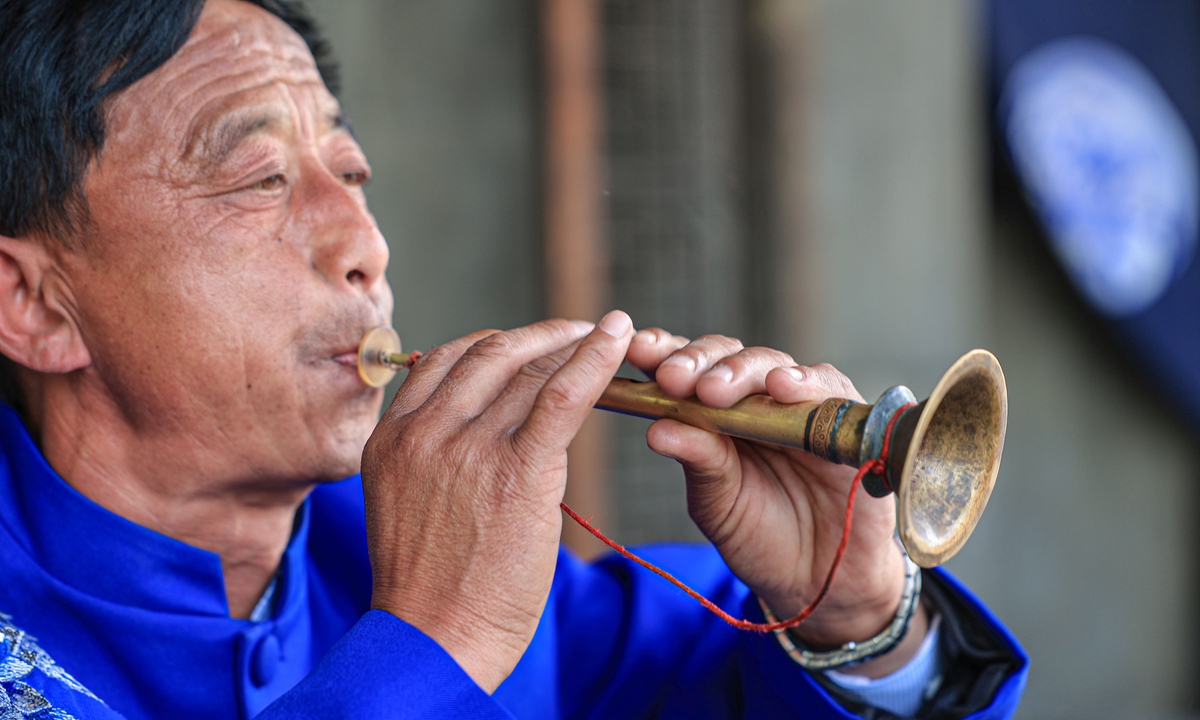
"I started to learn to play suona when I was very little. At around 7 or 8 years old, I followed my father to practice the instrument," Sun said. "In the past, we did not know music theory and did not have music score. My father would hum the melodies, and I'd remember them in my mind."
"My family was poor, so I would skip school to see suona performances. In this way I could follow the big troupes and freeload on good food," he said.
In the rural regions, having a decent suona band to perform for several days with good tracks is a great honor. At funerals, it is a sign of respect for the dearly departed.
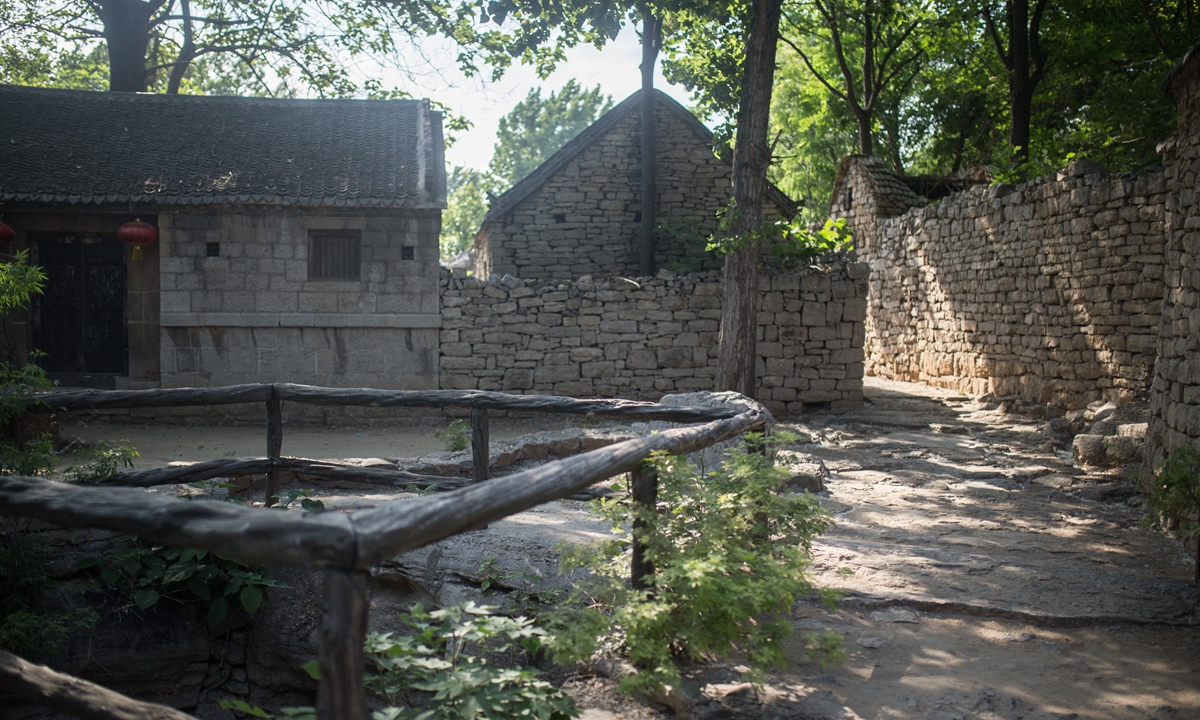
"We would attend where there was a wedding or a funeral. Rain or shine, we were never late, no matter how heavily it rained," he said.
Nowadays, the need for suona bands in rural areas is not as much as before. But Sun still insists on preserving his heritage. He hopes the sound of suona will accompany the life of the local people for generations to come.
The city in southwestern Shandong is rich in historic and cultural heritage - it is the hometown of Confucius, Mencius and other great ancient philosophers; it is also a major city by the Beijing-Hangzhou Grand Canal; in every dynasty, Jining has been mentioned in writing in various works of literature.
Nowadays, the city is left with the tangible remains of its long history, such as the buildings that mark the glory of Confucius' families and museums about the Grand Canal among other heritage sites.
Meanwhile, the intangible cultural heritage of Jining continues to be treasured and carefully preserved.
Intangible cultural heritage is an indispensable part of people's lives. Its protection and transmission to future generations play an important role in the development of culture and society.

Children learn about traditional culture at Confucius Museum, Qufu of Jining, East China's Shandong Province. Photo: Shan Jie/GT
In terms of representative inheritors, Jining has 11 national-level, 36 provincial-level and 165 municipal-level inheritors, forming a complete four-level, intangible heritage list system.
All counties and cities in the city have established a comprehensive project database, archived and preserved intangible cultural heritage projects through videos, pictures, texts and other media. The city has established a regular tournament system with related inheritors showing and passing on their inheritances.
Intangible cultural heritage is the cultural epitome of a place and represents its cultural soft power. It is of great significance to protect and transmit this heritage.
People in Jining believe that only by digging deeper and making good use of their intangible heritage might the cultural treasures left by their ancestors be remembered in the swift tide of the modern age, and allow the local culture to be more vibrant.
Confucius and foodie
In 2016, a TV documentary, Confucius Was a Foodie, was broadcast in North America, with star chef Christine Cushing exploring the essence of traditional Chinese cuisines guided by Confucius' philosophy on food.
Confucius once said, "With coarse rice to eat, with water to drink, and my bent arm for a pillow; I have still joy in the midst of these things." But cherishing simple and ordinary does not mean he was not picky about food - The Analects of Confucius showed that the famous ancient philosopher cared for sanitary and healthy food; he also paid attention to the art of food, saying that food should be delicate and nicely prepared; moreover, he believed in dining there should be etiquette.

Photo:Web
Confucius Cuisine
"He did not dislike to have his rice finely cleaned, nor to have his minced meat cut quite small," Confucius said.
Confucius' philosophy on food was inherited by his descendants. In history, when receiving emperors, senior officials and other noble guests, or hosting family feasts, the Duke of Yansheng, a marquis title given to the direct descendant of Confucius, would prepare exquisite and tasty food.
The food gradually formed the unique Confucius Cuisine with deep cultural essence therein. In 2011, the skill to cook Confucius Cuisine was included in the list of China's national-level intangible cultural heritages.
The history of Confucius Cuisine could be dated to 272 BC and was inherited with innovations.
It has several features, covering its ingredients, skills, outlooks, names, and even the containers, Kong Fanyin, an inheritor of the Confucius Cuisine, told the Global Times. Kong has been cooking the cuisine for 34 years in a local restaurant in Qufu.

Photo:Web
Confucius Cuisine
Firstly, Confucius Cuisine picks ingredients from a very broad range of sources - no matter whether it is from the mountain or the sea, grains or vegetables, fungi or fruits, all could be used in Confucius Cuisine dishes. Chefs of Confucius Cuisine would pick the best ingredients available, and use them in different ways.
Skills associated with the cooking of Confucius Cuisine are complex and comprehensive. To make a full diner, it would take up to three days and seven or eight people to complete preparations.
Another characteristic is that Confucius Cuisine is good at seasoning the food with special soups, which are made by using three fat ducks, three fat hens, three pigs and some chicken feet, pig ribs and several other bits of seasoning.
The containers of Confucius Cuisine show its luxury. In the Confucius Museum in Qufu, a full set of Confucius Cuisine containers fill a huge exhibition room. The bowls, dishes and wares were made into different shapes, illustrating what's inside, such as duck and carp.

A carp-shape container exhibited at Confucius Museum Photo: Shan Jie/GT
Nowadays, ordinary people in Qufu could also have the opportunity to experience a bit of it. Dishes such as smoked Tofu have become a daily staple for local residents to enjoy.
Confucian Cuisine is a unique cuisine formed by the descendants of Confucius in their long-term life practices. It embodies the distinctiveness and heritage of Confucian culture. Among all the Chinese cuisines, Confucius Cuisine has the most cultural connotation and artistic characteristics.
The art of fire and clay
In the ZooParc de Beauval of central France, giant pandas, Huan Huan and Yuan Zai are unsurprisingly the most popular stars. As visitors continue to enjoy the undeniable cuteness of the pair, they might also be blown away by the elegant Chinese-style building at the panda house, especially its shiny glazed tiles.
The colorful glazed tiles are produced by Qufu Glazed Tile Factory Co in Jining. For centuries, the factory has made tiles for the Temple of Confucius, the Mansion of the Kong family and the Forest of the Kong family.

Nowadays, the factory continues to make glazed tiles for the renovation of the three most significant buildings related to Confucius. Moreover, inheritors of the techniques of making glazed tiles have promoted this intangible cultural heritage and sold their tiles to the whole of China and international markets.
In 2014, the technique of Qufu's glazed tile making was included in China's representative List of the Intangible Cultural Heritage.

Colorful glazed tiles made by the Qufu Glazed Tile Factory Co Photo: Shan Jie/GT
In China, glazed tiles are the representatives of beauty. They are solid, colorful and bright. They are cherished in the building of ancient China, Wang introduced.
Wang posited that glazed tiles made by the Qufu glazed tile factory are different from many others. "Ours are more polished and refined."
For example, the lion statues on the roofs of the Confucius Temple and the Confucius Mansion look less fierce than others but are more gentle, which reflects a temperament influenced by Confucian culture.
To cater to the needs of modern times, the glazed tile factory has been making innovations. For instance, Wang led the factory to build a natural gas kiln using to replace the original one, in order to reduce polluting emissions while burning the tiles.

A senior sculptor makes a worrier statue at the Qufu Glazed Tile Factory Co Photo: Shan Jie/GT
Wang hopes that more young people can join the team to inherit and promote the technique of making colorful glazed tiles. To fulfill this wish, he plans to build a museum for the tiles and invite more students learning art to experience the ancient technique at the factory.
Sound of life
For people in northern China, the sound of suona surrounds every aspect of their lives - the suona band is indispensable, no matter the occasion, whether wedding or funeral. Suona is a typical Chinese wind instrument.
The suona performance style in Zoucheng county, Jining is called the Ping School. The suona used in Ping School performances has a unique bronze pipe. It has a brighter, crisper and penetrating sound. It can mimic many sounds, such as dogs, cats and ducks.
Sun Huayang, 52, is the inheritor of the Ping School suona performance. The skill has been passed on for six generations in Sun's family.

Sun Huayang plays suona Photo: Yang Ruoyu/GT
"My family was poor, so I would skip school to see suona performances. In this way I could follow the big troupes and freeload on good food," he said.
In the rural regions, having a decent suona band to perform for several days with good tracks is a great honor. At funerals, it is a sign of respect for the dearly departed.

Shangjiu, an ancient village in Zoucheng county, Jining Photo: Shan Jie/GT
Nowadays, the need for suona bands in rural areas is not as much as before. But Sun still insists on preserving his heritage. He hopes the sound of suona will accompany the life of the local people for generations to come.


